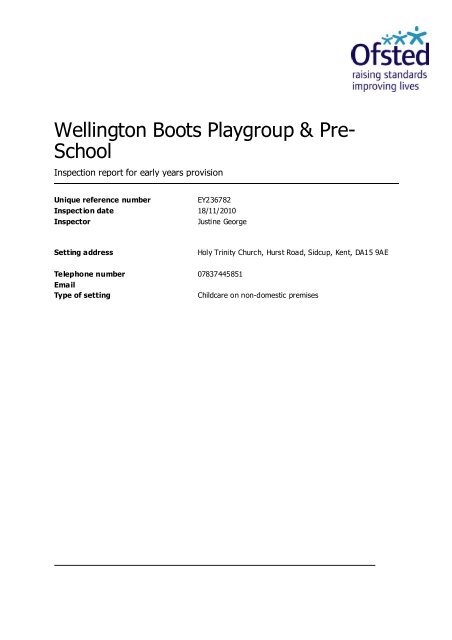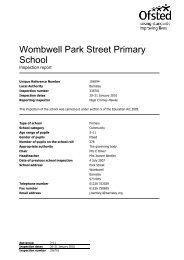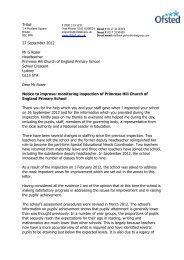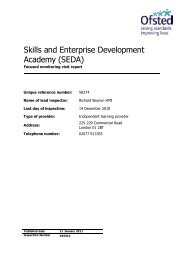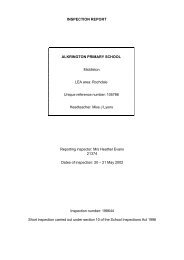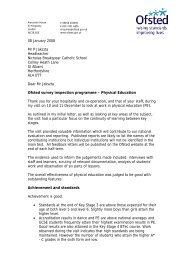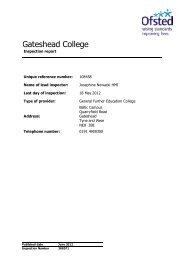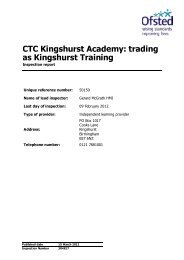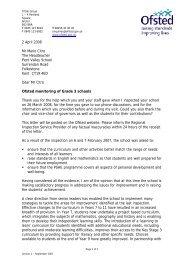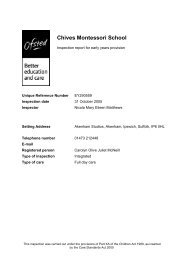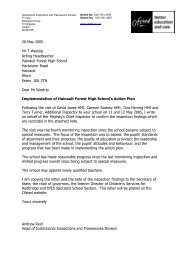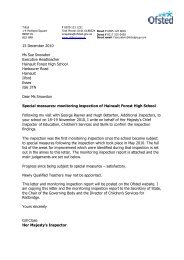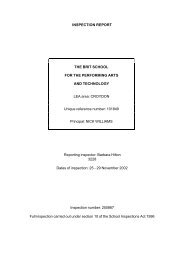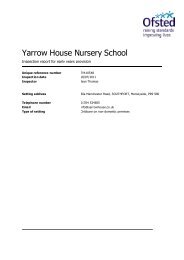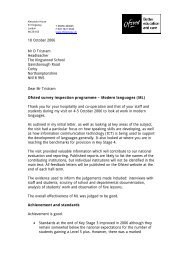Wellington Boots Playgroup & Pre- School - Ofsted
Wellington Boots Playgroup & Pre- School - Ofsted
Wellington Boots Playgroup & Pre- School - Ofsted
Create successful ePaper yourself
Turn your PDF publications into a flip-book with our unique Google optimized e-Paper software.
<strong>Wellington</strong> <strong>Boots</strong> <strong>Playgroup</strong> & <strong>Pre</strong>-<br />
<strong>School</strong><br />
Inspection report for early years provision<br />
Unique reference number EY236782<br />
Inspection date 18/11/2010<br />
Inspector Justine George<br />
Setting address Holy Trinity Church, Hurst Road, Sidcup, Kent, DA15 9AE<br />
Telephone number 07837445851<br />
Email<br />
Type of setting Childcare on non-domestic premises
Inspection Report: <strong>Wellington</strong> <strong>Boots</strong> <strong>Playgroup</strong> & <strong>Pre</strong>-<strong>School</strong>, 18/11/2010<br />
The Office for Standards in Education, Children's Services and Skills (<strong>Ofsted</strong>) regulates and inspects<br />
to achieve excellence in the care of children and young people, and in education and skills for<br />
learners of all ages. It regulates and inspects childcare and children's social care, and inspects the<br />
Children and Family Court Advisory Support Service (Cafcass), schools, colleges, initial teacher<br />
training, work-based learning and skills training, adult and community learning, and education and<br />
training in prisons and other secure establishments. It assesses council children’s services, and<br />
inspects services for looked after children, safeguarding and child protection.<br />
If you would like a copy of this document in a different format, such as large print or Braille, please<br />
telephone 0300 123 1231, or email enquiries@ofsted.gov.uk.<br />
You may copy all or parts of this document for non-commercial educational purposes, as long as<br />
you give details of the source and date of publication and do not alter the information in any way.<br />
T: 0300 123 1231<br />
Textphone: 0161 618 8524<br />
E: enquiries@ofsted.gov.uk<br />
W: www.ofsted.gov.uk<br />
© Crown copyright 2010<br />
2
Inspection Report: <strong>Wellington</strong> <strong>Boots</strong> <strong>Playgroup</strong> & <strong>Pre</strong>-<strong>School</strong>, 18/11/2010<br />
Introduction<br />
This inspection was carried out by <strong>Ofsted</strong> under Sections 49 and 50 of the<br />
Childcare Act 2006 on the quality and standards of the registered early years<br />
provision. ‘Early years provision’ refers to provision regulated by <strong>Ofsted</strong> for children<br />
from birth to 31 August following their fifth birthday (the early years age group).<br />
The registered person must ensure that this provision complies with the statutory<br />
framework for children’s learning, development and welfare, known as the Early<br />
Years Foundation Stage.<br />
The provider must provide a copy of this report to all parents with children at the<br />
setting where reasonably practicable. The provider must provide a copy of the<br />
report to any other person who asks for one, but may charge a fee for this service<br />
(The Childcare (Inspection) Regulations 2008 regulations 9 and 10).<br />
The setting also makes provision for children older than the early years age group<br />
which is registered on the voluntary and/or compulsory part(s) of the Childcare<br />
Register. This report does not include an evaluation of that provision, but a<br />
comment about compliance with the requirements of the Childcare Register is<br />
included in Annex B.<br />
Please see our website for more information about each childcare provider. We<br />
publish inspection reports, conditions of registration and details of complaints we<br />
receive where we or the provider take action to meet the requirements of<br />
registration.<br />
This inspection was carried out under sections 49 and 50 of the Childcare Act 2006<br />
3
Inspection Report: <strong>Wellington</strong> <strong>Boots</strong> <strong>Playgroup</strong> & <strong>Pre</strong>-<strong>School</strong>, 18/11/2010<br />
Description of the setting<br />
<strong>Wellington</strong> <strong>Boots</strong> <strong>Playgroup</strong> was registered in 2001 at the current setting, Holy<br />
Trinity Church Hall in Sidcup. The playgroup has use of two halls, a kitchen and<br />
toilets. It is a condition of registration that all children are escorted to the toilet by<br />
a member of staff, due to the fact that there are staff working in an office upstairs<br />
who share the same toilets. The playgroup is well established in the community<br />
and serves local families.<br />
The playgroup is registered on the Early Years Register and the voluntary and<br />
compulsory parts of the Childcare Register. It operates Monday to Friday 9.30am<br />
until 12 noon during school term time. It is registered to care for 26 children from<br />
two to five years. No more than eight children may be under three years. Currently<br />
there are 38 children on roll. Children attend a variety of sessions. The playgroup<br />
supports children with identified special educational needs and children who speak<br />
English as an additional language. The staff team comprises of a play leader and<br />
co-leader/deputy, both of whom hold a recognised childcare qualification. There is<br />
a total of eight staff members, of which six members of staff work directly with the<br />
children; all hold or are working towards a recognised childcare qualification.<br />
The playgroup receives support from the Bexley Early Years Development and<br />
Childcare Partnership. The playgroup is a member of the <strong>Pre</strong>-school Learning<br />
Alliance.<br />
The overall effectiveness of the early years provision<br />
Overall the quality of the provision is satisfactory.<br />
Children are warmly welcomed by a caring staff team and they show a strong<br />
sense of belonging. Children are happy and settled and have developed positive<br />
relationships outside the family home. Staff engage with children well, exploring<br />
activities together, although opportunities to extend their learning and<br />
development are not consistently put into practice. This is due to the planning of<br />
activities which does not yet identify the possible learning intentions to ensure<br />
children are sufficiently challenged. Staff are keen to maintain continuous<br />
improvement and identify areas for development. Although, they have not yet fully<br />
put their ideas into practice to further improve the outcomes for children.<br />
What steps need to be taken to improve provision<br />
further?<br />
To meet the specific requirements of the EYFS, the registered person must:<br />
conduct a risk assessment and review it regularly at<br />
least once a year or more frequently where the need<br />
arises. The risk assessment must identify aspects of<br />
This inspection was carried out under sections 49 and 50 of the Childcare Act 2006<br />
18/11/2010<br />
4
Inspection Report: <strong>Wellington</strong> <strong>Boots</strong> <strong>Playgroup</strong> & <strong>Pre</strong>-<strong>School</strong>, 18/11/2010<br />
the environment that need to be checked on a regular<br />
basis and include when and by whom they have been<br />
checked (Suitable premises, environment and<br />
equipment) (also applies to both parts of the Childcare<br />
Register)<br />
To further improve the early years provision the registered person should:<br />
review the structure of whole group times and the allocated time for outdoor<br />
play to ensure that the individual needs of all children are met and such<br />
times are purposeful and engaging for all children<br />
ensure observations of children's learning and development are used to<br />
inform the planning and identify the possible learning intentions of activities<br />
to ensure staff sufficiently challenge and meet the individual needs of<br />
children<br />
ensure there are hygienic methods used for the cleaning of hands to<br />
minimise the risk of cross infection and maximise the opportunities for<br />
children to develop independence at snack time<br />
improve self-evaluation methods by taking action to address the identified<br />
areas for improvement and evaluate the impact to assess the outcomes for<br />
children.<br />
The effectiveness of leadership and management of<br />
the early years provision<br />
Children's safety is fostered as suitable recruitment and vetting procedures are in<br />
place. Staff have had or are in the process of having the required checks carried<br />
out to ensure their suitability and un-vetted adults are never left alone with<br />
children. The premises are safe and secure and staff are vigilant in supervising<br />
children at arrival and departure times and throughout the session. However, the<br />
setting has not carried out the required risk assessments to ensure all hazards are<br />
indentified and minimised, which is a breach of welfare requirements. Staff have<br />
suitable knowledge of child protection safeguarding issues to ensure vulnerable<br />
children are protected. Staff also have sound knowledge of ensuring children's<br />
safety and welfare, for example, correct procedures are in place for administering<br />
medication and several staff have current first aid training, and the team record<br />
accidents and ensure parents are informed as required.<br />
There are suitable self-evaluation systems in place to identify the setting's<br />
strengths and areas of improvement. Both service users and providers have<br />
opportunities to contribute towards this and, as a result, some improvements have<br />
been made, for example, a notice board is displayed giving parents and carers<br />
more information about the topics and events taking place and the outdoor area<br />
has been developed. Staff identify ways to improve planning and assessment<br />
methods for children which is likely to improve the learning and development<br />
outcomes for children. However, such ideas have not yet been put into practice.<br />
Therefore, it is unclear what progress children are making as assessment methods<br />
are not yet used to inform planning to ensure the learning and development needs<br />
This inspection was carried out under sections 49 and 50 of the Childcare Act 2006<br />
5
Inspection Report: <strong>Wellington</strong> <strong>Boots</strong> <strong>Playgroup</strong> & <strong>Pre</strong>-<strong>School</strong>, 18/11/2010<br />
of children are met or sufficiently challenged. In addition, the assessment sheets in<br />
place are not fully utilised to identify where children are at in relation to the early<br />
learning goals.<br />
Staff have developed positive relationships with parents and carers and feedback<br />
from parents is positive. Parents agree that the staff team are friendly and their<br />
children are happy and settled. Information about the setting is made available to<br />
parents through booklets and access to policies, procedures and planning. As a<br />
result, parents are aware of the setting's responsibilities in caring for children and<br />
the range of activities they explore. Parents feel well informed about their child's<br />
general well-being whereby verbal communication takes place on a daily basis,<br />
although there are limited opportunities to specifically discuss children's learning<br />
and developmental progress. Staff realise the importance of working in partnership<br />
with other professionals who may be involved in the care of children. However,<br />
this has not been explored where children attend other early years provisions to<br />
fully ensure continuity and consistency of care.<br />
The quality and standards of the early years provision<br />
and outcomes for children<br />
Children have access to a wide range of resources which enables them to explore<br />
the areas of learning. Children enjoy small world play of a dolls' house, use<br />
dressing up clothes and play dough, providing them with opportunities to act out<br />
real life experiences aiding their knowledge and understanding of the world and<br />
their personal, social and emotional development. Children enjoy looking at books<br />
both independently and with an adult and there are opportunities for mark making<br />
and encouragement from staff for children to write their names on any creations.<br />
Children take it in turns to use the computer and are developing their information<br />
and communication technology skills operating simple programmes and using the<br />
keyboard and mouse. Children enjoy messy creative play of sticking and painting<br />
and concentrate really hard to master the skill of using scissors in which they are<br />
given good encouragement. Staff plan a range of experiences and activities for<br />
children to explore, however, the learning aims of such activities are not identified.<br />
As a result, the opportunity to further extend and differentiate children's learning<br />
to meet the various learning abilities is not consistently applied. Therefore, some<br />
activities lack challenge and without the support of an adult, activities are left<br />
unused. Children benefit from the free-flow structure of the session as they choose<br />
what they would like to do and have ample time to explore at a pace that suits<br />
them. Although, whole group time is less beneficial to all children as younger<br />
children loose interest in what is happening and become restless. Furthermore, as<br />
children all go into the garden together, too many are trying to use the sand or<br />
cutlery table at one time, impacting on their enjoyment.<br />
Children are well on their way in making a positive contribution as they are happy<br />
and settled and relate really well to the adults. Children behave and cooperate with<br />
each other well, develop friendships and interact with each other during play. They<br />
show good levels of self-esteem as staff often praise children for their<br />
achievements and efforts made which is genuine and personal to the child.<br />
This inspection was carried out under sections 49 and 50 of the Childcare Act 2006<br />
6
Inspection Report: <strong>Wellington</strong> <strong>Boots</strong> <strong>Playgroup</strong> & <strong>Pre</strong>-<strong>School</strong>, 18/11/2010<br />
Children help to look after the provision, helping at tidy up time and are<br />
resourceful putting empty boxes into a container to be used again. Children learn<br />
about people within the community as visitors such as the local librarian and<br />
community support officers visit the setting sharing their experiences. Parents also<br />
come in to share their experiences and skills. A recent event of the Diwali<br />
celebration was celebrated, whereby a parent shared the Hindu tradition with<br />
children retelling the story and looking and sampling traditional clothing and food.<br />
As a result, children learn about people who help us and the diverse community in<br />
which we live.<br />
Children's health is suitably fostered. They participate in physical play, for example,<br />
bowling and using the recently developed outdoor area for fresh air and exercise.<br />
Children enjoy the range of fresh healthy snacks such as fruit and breads, and staff<br />
talk about the various fruits and the benefits of eating healthily. However, the<br />
opportunities for children to develop their self-help skills and make independent<br />
choices of what they would like to eat are minimised. This is because food and<br />
drink is out of reach; as a result, some children have to wait to be served rather<br />
than managing themselves. Children's hygiene is suitably promoted; tissues are<br />
available and children use these to wipe their nose and dispose of waste in bins.<br />
Children wash their hands after messy play and before eating, although they use a<br />
communal bowl increasing the risk of cross infection.<br />
Children move around the setting safely and take responsibility in managing their<br />
safety, for example, children walk inside, know to ask an adult if they want to use<br />
the bathroom and use equipment such as scissors appropriately. Children practise<br />
fire drills and learn about road safety as visits from the local lollipop lady reinforce<br />
their understanding. Children learn about the boundaries in place as staff share<br />
rules and give explanations to further develop their understanding.<br />
This inspection was carried out under sections 49 and 50 of the Childcare Act 2006<br />
7
Inspection Report: <strong>Wellington</strong> <strong>Boots</strong> <strong>Playgroup</strong> & <strong>Pre</strong>-<strong>School</strong>, 18/11/2010<br />
Annex A: record of inspection judgements<br />
The key inspection judgements and what they mean<br />
Grade 1 is Outstanding: this aspect of the provision is of exceptionally high quality<br />
Grade 2 is Good: this aspect of the provision is strong<br />
Grade 3 is Satisfactory: this aspect of the provision is sound<br />
Grade 4 is Inadequate: this aspect of the provision is not good enough<br />
The overall effectiveness of the early years provision<br />
How well does the setting meet the needs of the<br />
children in the Early Years Foundation Stage?<br />
The capacity of the provision to maintain continuous<br />
improvement<br />
The effectiveness of leadership and management of the early<br />
years provision<br />
The effectiveness of leadership and management of the 3<br />
Early Years Foundation Stage<br />
The effectiveness of leadership and management in embedding 3<br />
ambition and driving improvement<br />
The effectiveness with which the setting deploys resources 3<br />
The effectiveness with which the setting promotes equality and 3<br />
diversity<br />
The effectiveness of safeguarding 3<br />
The effectiveness of the setting’s self-evaluation, including the<br />
3<br />
steps taken to promote improvement<br />
The effectiveness of partnerships 3<br />
The effectiveness of the setting’s engagement with parents and 3<br />
carers<br />
The quality of the provision in the Early Years Foundation<br />
Stage<br />
The quality of the provision in the Early Years Foundation Stage 3<br />
Outcomes for children in the Early Years Foundation Stage<br />
Outcomes for children in the Early Years Foundation<br />
3<br />
Stage<br />
The extent to which children achieve and enjoy their learning 3<br />
The extent to which children feel safe 3<br />
The extent to which children adopt healthy lifestyles 3<br />
The extent to which children make a positive contribution 2<br />
The extent to which children develop skills for the future 3<br />
Any complaints about the inspection or report should be made following the<br />
procedures set out in the guidance available from <strong>Ofsted</strong>’s website:<br />
www.ofsted.gov.uk<br />
This inspection was carried out under sections 49 and 50 of the Childcare Act 2006<br />
3<br />
3<br />
8
Inspection Report: <strong>Wellington</strong> <strong>Boots</strong> <strong>Playgroup</strong> & <strong>Pre</strong>-<strong>School</strong>, 18/11/2010<br />
Annex B: the Childcare Register<br />
The provider confirms that the requirements of the<br />
compulsory part of the Childcare Register are:<br />
The provider confirms that the requirements of the<br />
voluntary part of the Childcare Register are:<br />
Not Met (with<br />
actions)<br />
Not Met (with<br />
actions)<br />
The registered provider does not meet the requirements of the compulsory and or<br />
voluntary part/s of the Childcare Register.<br />
To comply with the requirements of the compulsory part of the Childcare Register,<br />
the registered person must take the following action/s by the specified date:<br />
take action as specified in the early years section of<br />
the report (Suitability and Safety of <strong>Pre</strong>mises and<br />
Equipment)<br />
This inspection was carried out under sections 49 and 50 of the Childcare Act 2006<br />
18/11/2010<br />
To comply with the requirements of the voluntary part of the Childcare Register, the<br />
registered person must take the following action/s by the specified date:<br />
take action as specified in the early years section of<br />
the report (Suitability and Safety of <strong>Pre</strong>mises and<br />
Equipment)<br />
18/11/2010<br />
9


